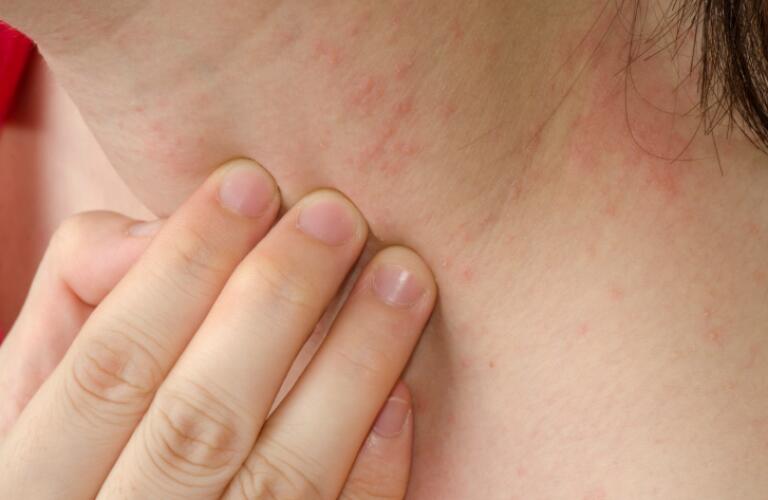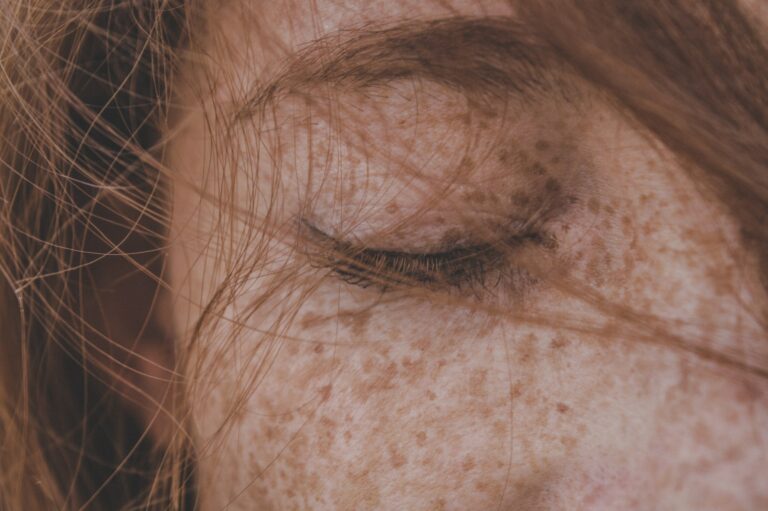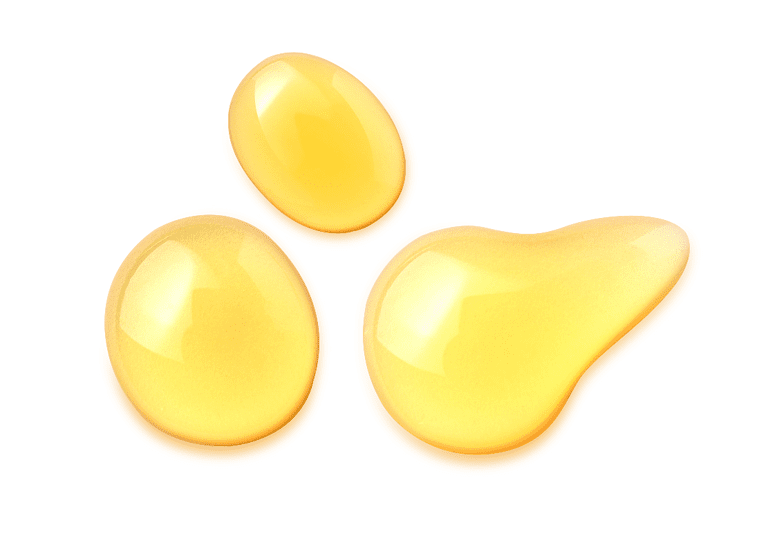Here’s What You Need To Know About Atopic Dermatitis

Feeling self-conscious about dry or flaky skin is not just about wanting to look beautiful – it’s about feeling confident in your skin. This blog post will help you learn everything you need to know about atopic dermatitis, what ingredients you should avoid, and what ingredients you should add to your skincare routine.
Here is an overview of the topics discussed:
- What Is Atopic Dermatitis?
- What Causes Atopic Dermatitis?
- Is It Common In Pregnancy?
- How Is It Different In Children Vs Adults?
- Is It The Same Or Different Than Eczema?
- Atopic dermatitis On The Face Vs Body
- What Topic Treatments Are Best For This Condition?
- Are Vitamin C Supplements and Topic Serums Safe For Individuals With Atopic Dermatitis?
- What Skincare Ingredients You Should Avoid?
- What Skincare Ingredients To Use? Does Vitamin C Help Atopic Dermatitis?
WHAT IS ATOPIC DERMATITIS?
Atopic dermatitis, the most common type of eczema, is a chronic condition that causes inflammation of the skin. It is a common misconception that atopic dermatitis only affects children. Also, it is common among children, but it can also happen to adults or can return in adulthood.
Here are some common symptoms of this condition:
- Dry or leathery skin
- Itching
- Bumpiness
- Scaly or flaky patches of skin
- Redness
- Inflamed skin
- Soreness or discomfort
- Cracked skin
Atopic dermatitis can fluctuate or flare-up throughout your lifetime or it can occur for the first time.

WHAT CAUSES ATOPIC DERMATITIS?
There are many causes of atopic dermatitis. Triggers can include the environment, genetics, immune system, and stress levels.
- The Environment. Environmental factors like climate, temperature, air pollutants, and clothing can irritate the skin and cause inflammation. For example, dust and pollen can aggravate atopic dermatitis or sensitive skin.
- Genetics. You are more than likely to experience atopic dermatitis or symptoms of eczema if it runs in your family. Also, individuals with asthma are at higher risk.
- Immune System. The skin is more sensitive than usual because the immune system overreacts to allergens.
- Stress. Emotional distress does not cause eczema, but it can make it worse. When your body experiences stress it releases a hormone called cortisol. Therefore too much stress causes an imbalance in the immune system causing the skin to flare up.
Please note that it is not contagious, and it is a type of eczema, a group of skin conditions.
IS It COMMON IN PREGNANCY?
Pregnancy can bring about many changes throughout the body, including the skin. Also, immune system changes are very common in pregnancy. Therefore atopic dermatitis is the most common skin condition to occur during pregnancy.
If you have a history of atopic dermatitis, you are more likely to have flare-ups during pregnancy, but it can also occur for the first time as well.
To prevent this skin condition or keep it from becoming worse, it is common for doctors to recommend moisturizers and ointments, sometimes even topical steroids if it is severe. Moreover, the use of topical steroids can trigger or create more issues for the skin, like skin purging or breakouts.
HOW IS It DIFFERENT IN CHILDREN VS ADULTS?
Atopic dermatitis is commonly found in children, but it also can show up in adulthood. This condition in children usually gets better over time. However, there are key differences to spot between pediatric atopic dermatitis and adult-onset dermatitis.
Pediatric dermatitis:
- Flexural lesions or rashes in body regions that crease or fold; i.e., behind the knee, elbows, or armpits
- Atopic dermatitis changes as children grow and develop
- Walking and crawling contribute to the increase of flexural lesions because the skin rubs together
- Scratching or rubbing the skin on the face can lead to the development of atopic dermatitis on facial skin
Adulthood:
- Fewer flexural lesions
- Appears on extensor areas; i.e. front of knee, back of elbow, and/or forearms
- Appears on the head, neck, arms, hands, and/or leg area
- Can connect to mental health issues like anxiety or depression
Also it is a common misconception that it occurs only in childhood, but it’s important to know that it’s not just kids who get it, adults can experience it too.

IS It THE SAME OR DIFFERENT THAN ECZEMA?
Dermatitis is a term that describes inflammation of the skin. Dermatitis and eczema are used interchangeably. Eczema is used more as an umbrella term for different types of dermatitis. For example, atopic dermatitis is a type of eczema, a group of skin conditions. Eczema and psoriasis as well as atopic dermatitis are all skin inflammations.
Here is a list of different types of dermatitis:
- Atopic dermatitis
- Contact dermatitis
- Dyshidrotic dermatitis
- Seborrheic dermatitis
Atopic dermatitis ON THE FACE VS BODY
Atopic dermatitis can occur in many areas of the body.
However it is common for it to show up on the face first and then spread to other parts of the body. Facial dermatitis can appear near the eyes, cheeks, lips, and forehead. Therefore the dryness can make your skin feel crusty and thick like you are chipping paint off a wall.
Symptoms of facial atopic dermatitis are very similar to atopic dermatitis on the body. The key difference is that it appears differently on different skin tones. On lighter skin can appear red or pink. On the other hand, on darker skin tones shows up as brown, gray, or purple.
It can range from mild to severe. Mild atopic dermatitis consists of dry and itchy redness of the skin. Severe condition involves cracking and/or bleeding of the skin.
WHAT TOPICAL TREATMENTS ARE BEST FOR This Condition?
Atopic dermatitis can go away on its own, but for some, that is simply not the case. Doctors and dermatologists commonly recommend medical treatments, this list includes:
- Antihistamines. Allergy symptom reliever; i.e. Benadryl or similar products
- Topical creams. Steroids like hydrocortisone
- Creams or lotions. Hydrating moisturizers
Unfortunately, there is no such thing as a quick fix for dermatitis. Medical treatments especially take time to show results and sometimes the use of medical treatments can lead your skin to become worse before it can get better. This can be frustrating for individuals with Atopic dermatitis, and rightly so, leading people towards natural alternatives like:
- Natural moisturizers; i.e., aloe, cold-pressed coconut oil, or cold-pressed sunflower oil
- Bathing. Bathing in bath-oil/essential oils or bathing in oatmeal
Choosing between medical treatments and natural treatments depends on the person. However, you should always consult with a doctor before using a new product or starting a new skincare routine.
ARE VITAMIN C SUPPLEMENTS AND TOPICAL SERUMS SAFE FOR INDIVIDUALS WITH ATOPIC DERMATITIS?
Vitamin C supplements and topical creams are generally safe to use to help treat this condition, but there is a catch. Certain ingredients like chemicals or synthetic-lab-produced substances can be harsh on sensitive skin or individuals suffering from this condition.
Plant Mother’s line of skincare is made with only the highest quality of ingredients and Plant Mother’s vegan Vitamin C serum and Retinol are plant-based products made for even the most sensitive skin. The ingredients are free from chemicals, synthetics, pesticides, or any other toxins.

WHAT SKINCARE INGREDIENTS YOU SHOULD USE to HELP ATOPIC DERMATITIS?
Here are the ingredients you should look for to treat dermatitis:
- Hyaluronic acid. Helps hydrate the skin. You can find this ingredient in most moisturizers and serums. Your skin deserves the cleanest and healthiest ingredients out there. Healthy skin can be achieved without the harsh chemicals and toxins from synthetically made products. Basically, clean skincare is your best friend.
- Niacinamide. Helps reduce redness and bring brightness and glow. Plant Mother’s Vitamin C serum contains niacinamide and vitamin c in a powerful formula mixed with quercetin and vitamin E from Maracuja (Passion Fruit) and over 200 antioxidants.
- Anti-inflammatory botanicals. Sea buckthorn, Jojoba, Maracuja, Camelia, among others. Maracuja, also known as passion fruit, contains vitamins E, A, and C. These nutrients boost collagen production. Collagen is responsible for building skin elasticity, which can help repair broken skin caused by atopic dermatitis. Best face oils, if they’re organic and non-refined, are safe even for the most sensitive skin, like in pregnancy or during breastfeeding.
WHAT SKINCARE INGREDIENTS YOU SHOULD AVOID?
Individuals with sensitive skin are recommended not to use products containing the following ingredients:
- Skin exfoliants. Glycolic acid, salicylic acid, and retinol increase dryness and irritate the skin
- Preservatives. Skincare products containing preservatives like benzoic acid, sorbic acid, and lactic acid lead to inflammation
- Fragrances. Fragrances or perfumes cause eczema flare-ups. Look for labels that say “fragrance-free” or “unscented”
Vitamin C can come in several forms. It can be made synthetically or plant-based. To get the best out of your skincare, it is better to choose a plant-based option to get the non-toxic and clean ingredients.
Plant Mother takes pride in growing clean fresh ingredients using organic farming methods. The company’s ingredients are free from chemicals, pesticides, and GMOs. They are 100% vegan, organic, and cruelty-free.
KEY TAKEAWAYS
- Atopic dermatitis does not only occur in children, adults can experience it too
- Avoid harsh chemicals and pesticides, especially if you have this condition or a sensitive skin
- Vitamin C deficiency can cause skin dryness or aggravate skin sensitivity conditions like atopic dermatitis
- Clean plant-based products help fight free radicals and protect your skin
- Read the labels on your skincare products and look for vegan and organic ingredients
- Taking care of your skin also means taking care of your health so it is important that you consciously look for ingredients that are safe and healthy for you
MEDICAL DISCLAIMER
This content is for informational and educational purposes only. It is not intended to provide medical advice or to take the place of such advice or treatment from a personal physician. All readers of this content are advised to consult their doctors or qualified health professionals regarding specific health questions. The publisher of this content does not take responsibility for possible health consequences of any person or persons reading or following the information in this educational content. All viewers of this content, especially those taking prescription or over-the-counter medications, should consult their physicians before beginning any nutrition, supplement, skincare product, or lifestyle program.
